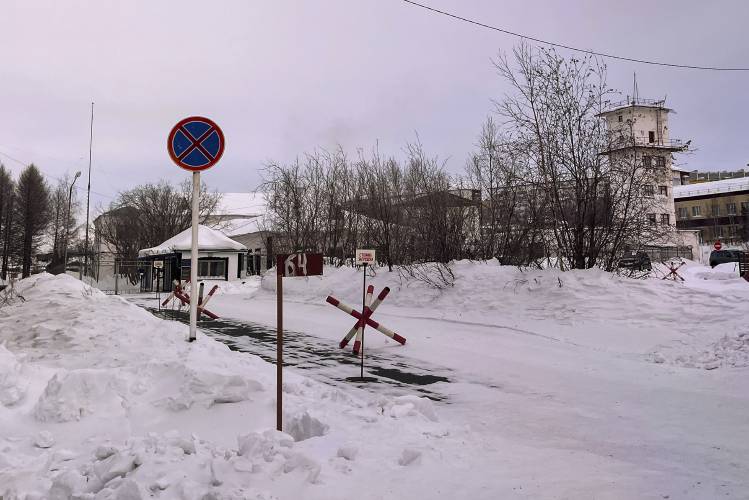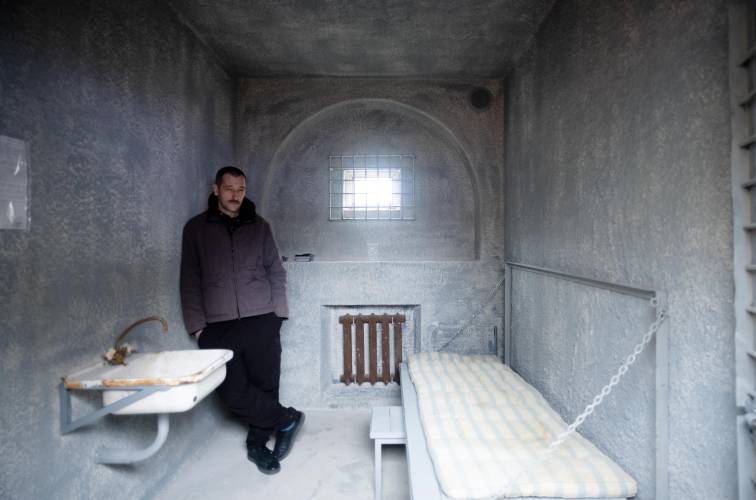Opinion: Scenes from inside a Russian prison
| Published: 02-29-2024 6:00 AM |
Elizabeth L. Hodges lives in Concord.
I have been in a Russian prison. I have had the prison head guard unlock the door to the cells and, before he could stop me, stepped in and peered through a tiny square in a locked door to see a human form curled in the corner on the floor with a ragged blanket pulled around themselves.
I have walked through the kitchen, where the only item was a ten-foot vat emitting an odor of rotten sewage. Continuously roiling soup. Made from whatever foodstuff and scraps were around. A thin broth that might keep one alive, but was not nourishing.
This was in the Vologda region, some 300 miles northeast of Moscow. The “we” were a delegation from the New Hampshire legal system including judges, lawyers, and justice system players, including, on this trip, the deputy commissioner for the state prison in New Hampshire, who was a woman.
“We” were part of an innovative USAID project that paired state legal systems with oblasts or regions in Russia to assist in establishing independent court systems under their 1993 constitution. The entire country was trying to stagger to its feet after the dissolution of communism.
Our trips alternated with bringing members from the justice system in Vologda to New Hampshire to show them examples of an independent court system. The first trip of judges to the U.S. included a tour of the state prison; at a lunch of tuna salad sandwiches and potato chips, the Russian judges laughed it was like a hotel. The deputy commissioner gave them baseball hats with the NH State Prison insignia.
In the 1970s, there was a spate of federal cases in New Hampshire addressing the conditions of the New Hampshire State Prison. The result was a general improvement in conditions. The court in Nadeau v. Helgemoe, 561 F. 2d 411 (NH 1977) recognized indisputably barbaric and indecent conditions at a prison result in cruel and unusual treatment protected against by the U.S. Constitution. The Russian Constitution of 1993 has a similar provision.
Our hosts in Vologda were reciprocal in their generosity in letting us see the various aspects of the justice system as it existed or as it was forming. Hence the visit outside Vologda city to the prison — a one-story building of square concrete rooms that had been newly painted, the smell of new paint mingling with the odor of the soup.
Article continues after...
Yesterday's Most Read Articles
 Update: Founder of neo-Nazi group spotted among masked protesters in Concord
Update: Founder of neo-Nazi group spotted among masked protesters in Concord
 Car strikes pedestrian in fatal collision on Loudon Road
Car strikes pedestrian in fatal collision on Loudon Road
 Concord Police investigating altercation involving neo-Nazi group; local officials and organizers condemn the Blood Tribe
Concord Police investigating altercation involving neo-Nazi group; local officials and organizers condemn the Blood Tribe
 NH Supreme Court rules Concord resident lacks standing, clearing way for Andy Sanborn’s casino plans on Loudon Road
NH Supreme Court rules Concord resident lacks standing, clearing way for Andy Sanborn’s casino plans on Loudon Road
 Work continues deconstructing Burlington store at Capitol Shopping Center into four retail spaces
Work continues deconstructing Burlington store at Capitol Shopping Center into four retail spaces
 Update: Three individuals seriously injured in Hopkinton rollover crash on I-89
Update: Three individuals seriously injured in Hopkinton rollover crash on I-89
I had read an article that tuberculosis was rampant in the Russian prisons and, not just tuberculosis, but treatment-resistant variants. A sentence of any length in a Russian prison was a potential death sentence because of the disease. I saw nothing that would dissuade me of that notion.
Each of the newly painted rooms had a purpose, but no people except for the “chapel” where a man with a fez nodded and smiled and assured us Muslims were allowed to worship as were Christians. Another room was a shop, empty except for an automobile engine. Other rooms, whose functions escaped us (no books anywhere), were eerily empty.
It was when I asked, where are the cells, where are the prisoners, that the door to the long low building was opened and I stepped through to the consternation of the head guard. The image is like a blurry photo negative that will never fade further. Was the floor dirt or concrete? Were there bits of straw on the floor? Was the fetal figure clothed or naked? Was there a ragged blanket or was that something else? What was the smell? None of my answers make me feel better.
Vladimir Putin was killing Alexei Navalny. I am sure Russian infrastructure and, perhaps, prisons, have improved since my last USAID visit in 2003. But seeing Navalny in a glass enclosure in court, reminiscent of the courtroom cages in Vologda, thus visually declaring an accused as guilty before the first word is uttered, is a statement to the government’s failure to establish that a person is innocent until found guilty. Or that imprisoning a person because of their political views is a violation of human rights. Or that an independent judiciary is a good thing. Or that prisoners deserve to be treated as humans.
I was sure that unless removed from prison, Navalny would die there. In 2018, the European Court of Human Rights ruled that Russia’s multiple arrests of Navalny resulted in a finding that it had abused prosecutorial powers with political intent, essentially accusing the Russians of lying. Russia was ordered to pay Navalny 63,678 Euros, or about $72,000, and to alter laws on public assembly.
Under the Russian Constitution of 1993, until the provision was rescinded in 2020, international law was the stated supreme law of Russia allowing Russian human rights claims to be heard in the international court in Strasbourg. At a Sakarov Lecture at the Davis Center at Harvard in 2013, one of the panelists stated that the largest number of cases before the court were from Russia and, at that time, fines, mostly to do with pension retention, were being paid.
At the time of the Navalny ruling in 2018, there were more allegations of rights abuse pending against Russia before the court than any other country or 19% of the total docket. The court in Strasbourg is no longer a binding option for the people of Russia. Nor was it for Navalny. They ordered his release and Russia responded they are interfering with sovereign power. His internal appeal was denied.
I have been in a Russian prison. We thought it was a time for hope, and, yet, I can’t get the stink out of my nose.
This My Turn is an extract of a longer work written when Navalny was first sentenced to prison. At the time, I remember from news reports, he was worried about contracting tuberculosis. Our strongest protest against Stalinesque fascism returning to our world is to call our representative and senators and ask them to fight for (not just back) money for Ukraine.









 Opinion: My client Ozzy Osbourne
Opinion: My client Ozzy Osbourne Opinion: Trumpism in a dying democracy
Opinion: Trumpism in a dying democracy Opinion: What Coolidge’s century-old decision can teach us today
Opinion: What Coolidge’s century-old decision can teach us today Opinion: The art of diplomacy
Opinion: The art of diplomacy
